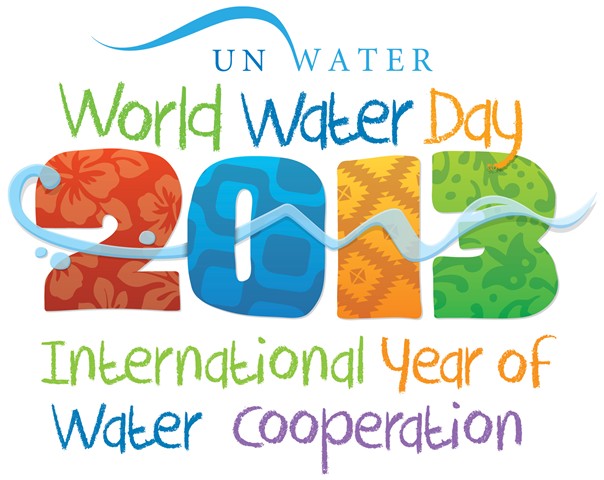
The United Nations Economic Commission for Europe (UNECE) is prepared to play a key role in addressing global water issues and, in particular, the vital need to further develop transboundary water cooperation. This was the message of Marco Keiner, Director of the UNECE Environment Division, speaking at the launch ceremony of the International Year of Water Cooperation, organized on 11 February 2011 at the United Nations Educational, Scientific and Cultural Organization (UNESCO) headquarters in Paris.
Representatives of Governments, local communities, specialized non-governmental organizations and United Nations organizations, as well as eminent specialists and youths, met today to discuss the necessity of water cooperation to effectively address water-related challenges and to fulfil the needs of all societies.. Indeed, growing pressures on water caused by population growth, urbanization, production and consumption patterns and climate change and variability impacts, especially in transboundary context, are increasing challenges ahead for water security.
“Competition is growing between farmers and herders; industry and agriculture; town and country. Upstream and downstream, and across borders, we need to cooperate for the benefit of all — now and in the future“, warned United Nations Secretary-General Ban Ki-moon, in his address during the launch ceremony.
“There is no sustainable development without sustainable water management. There is no sustainable water management without cooperation“, echoed UNESCO Director-General Irina Bokova. “In the field of water, cooperation is more interesting than competion: it is a driver of peace and of good management; it maximises benefits and adds value with a low cost.”
The International Year of Water Cooperation offers a precious chance to place inter-State cooperation on shared waters high on the global agenda, and to ensure the messages regarding the urgency of transboundary water cooperation and the importance of firm international legal frameworks are heard.
The pan-European region has much experience to share in this respect. Over the past 20 years, the UNECE Convention on the Protection and Use of Transboundary Watercourses and International Lakes (Water Convention) has provided an efficient framework for cooperation between UNECE countries. The entry into force on 6 February 2013 of the amendments to the Water Convention means that it is now a global instrument for transboundary water cooperation.
“Only by uniting forces will we be able to broaden the exchange of experience and mobilize the needed political support for transboundary water cooperation. That is why the global opening of the Water Convention is a great opportunity”, declared Marco Keiner, Director of the UNECE Environment Division, at the launch of the International Year of Water cooperation. It will indeed provide a much needed global forum to address transboundary water cooperation issues, to share experiences available worldwide and to work together for the sustainable management of transboundary waters.
Cooperation is not only key across borders but also between sectors: the Protocol on Water and Health to the Water Convention promotes a holistic approach, linking water management to health issues to ensure the provision of safe drinking water and adequate sanitation to everyone. The Protocol is also a powerful tool for the translation of the human right to water and sanitation into practice.
For further information, please visit http://www.unece.org/env/water/ and http://www.unwater.org/watercooperation2013/index.html
or contact:
Ms. Francesca Bernardini or Chantal Demilecamps
UNECE Water Convention Secretariat
Phone: 41 (0)22 917 2463
E-mail: [email protected], [email protected]
Note to editors
The United Nations General Assembly proclaimed 2013 the International Year for Water Cooperation in 2010, following a proposal from Tajikistan. At the request of UN Water, UNESCO was given responsibility for leading the Year’s events, in cooperation with UNECE and with the support of the United Nations Department of Economic and Social Affairs. The objective of the International Year of Water Cooperation is to raise awareness, both on the potential for increased cooperation and on the challenges facing water management in the light of the increased demand for water access, allocation and services.
Other major events marking the Year in which UNECE will contribute include World Water Day on 22 March (The Hague, the Netherlands), a conference on water cooperation to be held in August in Dushanbe (Tajikistan), World Water Week in Stockholm from 1 to 6 September, and the Water Summit, which will take place in Budapest from 8 to 11 October 2013.
The 1992 UNECE Water Convention aims to protect and ensure the quantity, quality and sustainable use of transboundary water resources by facilitating and promoting cooperation, through the exchange of knowledge and experience and by achieving common understanding on different issues related to water.
The Protocol on Water and Health is also a symbol of water cooperation: jointly serviced by UNECE and the World Health Organization Regional Office for Europe (WHO/Europe), it aims to protect human health and well-being. The Protocol closely links social and environmental aspects related to water and helps in addressing development and poverty issues. This unique instrument assists countries to implement the right to water and sanitation and to bring together different sectors such as water and health.

